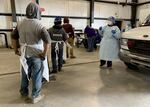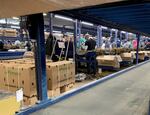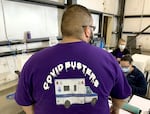
Laura Cobian, a registered nurse with Klamath Health Partnership, speaks with farmworkers waiting to be tested for COVID-19.
Erik Neumann / JPR
Half-a-dozen farmworkers stand in line in a towering warehouse for a company called Planasa outside Klamath Falls on a recent Saturday. They wear masks and their aprons are streaked with dirt from trimming strawberry plants. Bouncy accordion music plays from a Spanish radio station on a portable boombox.
A group of nurses and medical assistants from Klamath Health Partnership seat the workers in folding chairs. One by one, they insert the now-ubiquitous 6-inch nasal swab into the workers' noses to test for COVID-19.
Laura Cobian, a registered nurse, opens the back doors of a retired ambulance they bought and retrofitted.
“It’s basically a big inventory ambulance of anything and everything that we might be needing at our COVID testing sites,” she says.
Cobian grew up in Klamath Falls. Her parents were farmworkers. She says she joined Klamath Health Partnership to break down barriers to health care.

A health care worker from Klamath Health Partnership performs a nasal test on a farmworker at Planasa in Klamath County.
Erik Neumann
“I think we’re demonstrating it by this,” she says. “By having a COVID ambulance that we purchased specifically to be able to break those barriers and meet our community’s need of testing.”
Last Thursday the Oregon Health Authority and Klamath County Public Health announced more than 50 cases of COVID-19 from Planasa farmworkers living in the area during harvest season. The exact case numbers, between 54 and 59, vary from different health agencies based on when they were recorded.
The cluster was deemed a workplace outbreak by OHA. It marked the highest increase for Klamath Falls and contributed the largest single day total in the state since the pandemic began.
According to Planasa staff, all the workers have quarantined and recovered since they were tested in late September. The Oregon Health Authority says the outbreak was not announced sooner because of privacy risks of identifying individuals involved.
But it’s a real-life example of how Latinos, and farmworkers in particular, are at higher risk for COVID-19.
“When there’s no choice, when there’s no unemployment insurance, when there’s no income without working, you have the devil’s choice,” says UC Davis Professor Mark Schenker, who researches farmworker health. “You either go to work or you don’t have enough money for food. And what do you do?”

Seasonal farmworkers trim strawberry plants at Planasa outside of Klamath Falls.
Erik Neumann / JPR
Cobian, with Klamath Health Partnership, says there’s a host of factors that make it hard for farmworkers to get basic health care, including COVID-19 testing.
“When you have somebody that’s in a new community, traveling, there’s a language barrier, and then their only day off is usually a Sunday, and they’re coming here to work so they don’t want to [take] a day off. So, unless they’re really sick, they’re not going to take that time off,” she says.
Seasonal workers at Planasa arrived from Washington State, Northern Oregon, California’s Central Valley and Mexico and are working there for around six weeks. Positive COVID-19 cases are assigned to the county where an individual is living at the time they are tested, according to a spokesperson for the Oregon Health Authority.
Oscar Garcia, a human resources manager with Planasa, says all their seasonal workers in Oregon were asymptomatic when they were tested.
The cluster of cases does not pose a threat to residents of the county because they’ve completed quarantine, according to Valeree Lane with Klamath County Public Health.
“It’s shocking to have 54 cases announced all at once, but there’s nothing to be really that concerned about,” Lane says.
Occasionally there’s resistance to COVID testing from both farmworkers and owners, according to Schenker at UC Davis. He says farm owners worry if COVID cases appear, their operations will get shut down. Meanwhile, farm workers worry that testing positive will mean they have to stay home.
“We need to be testing to get a grip on this pandemic,” he says. “Identifying people and when they are infected, we need to be quarantining them and separating them and not having them spread the disease.”

Klamath Health Partnership Clinical Information Specialist Diego Aguirre shows off the organization's mobile COVID testing shirt.
Erik Neumann / JPR
By the end of the week the health workers test about 500 seasonal workers at Planasa.
Amanda Blodgett is the Chief Operations Officer with Klamath Health Partnership. She says their idea to provide a mobile clinic was meant to make it easier for farms and workers to get tested.
“So, if anybody is sick, it doesn’t go across the entire crew, because this is important work for these folks,” Blodgett says. “The work they do this summer will sustain them for the rest of the year. We don’t want them sent home, we want them to be healthy and to be able to continue to work.”
She worries that identifying a cluster of positive cases could discourage other farms from doing testing. But, she says, at Planasa they accomplished their goal: to help employees and control the spread of the virus.
